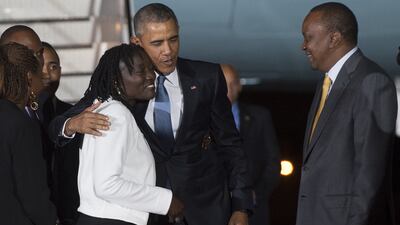As Kenya welcomed Barack Obama this weekend, the country found itself caught between two conflicting selves: on the one hand it tried to display a sense of security and calm, while on the other it is a country increasingly defined by conflict and corruption.
The Kenyan public encounters this tension every day on the country’s roads. Increasing concerns over theft, politicised ethnic conflict and terrorism – such as Al Shabab’s attack on a university in Garissa in April – have led to a greater police presence. Checkpoints dot the countryside and the police wield their power freely, checking documents and scrutinising vehicles. Even the most careful of drivers rarely gets by without handing over money for some concocted infraction and comic relief is found in this corruption by calling it everyday names: chai (tea), nyasi (grass), or kitu kidogo (something small). In recent weeks, I’ve also heard it called Obamas.
Indeed, Mr Obama’s visit to Kenya – and US engagement in the region more broadly – is shrouded in money.
As was made clear during the US-Africa Leaders Summit last year, the US views economic growth and the emergence of a strong middle class as being intrinsically connected to solid democratic institutions and security. Kenya, however, is not the humanitarian handout country it once was. Its bustling economy is the gateway to the wider region and a variety of partners – such as China – may not perceive business opportunities as needing to be as closely linked to democracy and transparency as America does.
The US and Kenya are in a sense searching for what kind of relationship to carry forward.
For the US, Kenya is increasingly geopolitically important. Its port at Mombasa and its transport links within East Africa – such as new highways, railways lines and oil pipelines – are critical to regional growth and are viewed as access points to the continent’s natural resources. Kenyan stability is also vital to its neighbours like Somalia and South Sudan, and Kenya is an important US ally against militancy and terrorism. Despite Kenya ranking poorly on corruption, the US seems to be trying to figure out how to stay involved with it and at what moral cost.
Overlooked by Mr Obama during his last Africa trip – in part because of president Uhuru Kenyatta’s 2011 indictment by the International Criminal Court for crimes against humanity – the US appears to be turning a blind eye to Kenya’s poor institutional record and culture of impunity in exchange for the benefits of engagement.
Kenya, too, is trying to understand its own relationship to the US. Even while it is ready to embrace Mr Obama with open arms, it cannot escape the strong anti-West rhetoric it has cultivated over the last few years. This is exemplified by Mr Kenyatta’s own presidential campaign, where the ICC indictment was used as a rallying cry, framing it as a threat to Kenyan independence.
With this visit, Kenya has been put in the international spotlight in a way that it has not been before. It is already a strong regional driver, yet its external ambitions will be limited by its own internal failings. The country has yet to address the wounds that have festered since the 2007 election. It needs a serious discussion about ethnicity. It needs to be able to hold its leaders to account. And it needs to tackle the culture of impunity and corruption that has been ingrained in everyday life.
Kenya and the US both share a strong entrepreneurial spirit, yet at the moment they appear uneasy and distrustful business partners. The US has ramped up its security presence and has issued travel advisories that are affecting Kenya’s tourism industry.
Kenya, in turn, strikes back. This is how a relationship largely built around money looks, and as the two countries seek to strengthen ties, Mr Obama and Mr Kenyatta need to ask themselves an important question: is it about heads of state sitting at the table, corporations and the barriers to trade? Or is it about everyday people and the roadblocks they encounter?
Brendan Buzzard is a freelance writer and Africa analyst based in Kenya





